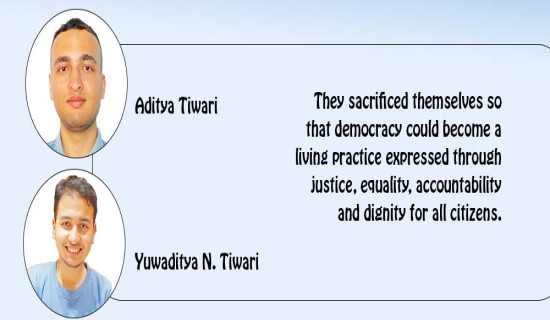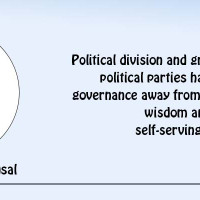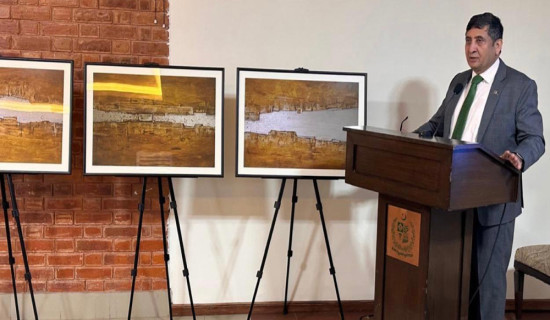- Friday, 30 January 2026
Audio Exposes Corruption At High Level
The Rastriya Swatantra Party (RSP) dismissed one of its lawmakers upon hearing the disgraced lawmaker's audio, in which he was requesting money worth Rs. 20 million from a businessman in the health sector. Even though the release of the recording coincided with the April 23 by-election, in which RSP Chairperson Rabi Lamichhane is contesting from a Chitwan constituency, it showed how deeply ingrained corruption is at the higher level. After the party took action against him, he threatened to reveal the names of the party's core team members, which "asked for money" in exchange for ministerial seats.
Stain
Durga Prasai, a fierce opponent of Lamichhane, exposed the audio in which Dhaka Kumar Shrestha asked for money from him so that he could give some of it to his party's "core team" in exchange the health minister’s position for him. The audio was, in fact, a stain on RSP, which had many highs and lows in the first six months of its existence. Even after making a large impression in the country's politics by winning 20 federal parliamentary seats in its first attempt, the party encountered issues that might hurt its chances of turning the initial victory into a significant political accomplishment. Despite a stellar election showing, the party was forced to endure the humiliation of seeing its chairperson lose his parliamentary seat when he was accused of not being a Nepali citizen at the time he ran for and won the election.
The RSP's move against the disgraced MP is commendable, but what irks many is the Shrestha's reference of the party core team for which he was soliciting funds to purchase a ministerial role. This is a significant problem that poses a danger to the basic foundation of a party, and more especially the nation's system of party-based politics. Shrestha has not yet disclosed the identities of the party's core team members, but it raises suspicions that there are some members, mostly at higher echelons, who ask money from their lower ranked leaders for appointing the latter to lucrative positions. The RSP now needs to clear such suspicion. For his apparent dubious role in taping and releasing the audio, Prasai must also be brought under the radar of law enforcing agencies.
A RSP parliamentarian asking money from a business person over the phone is not a recent occurrence. Gokul Baskota, a current CPN-UML parliamentarian, who served as minister of Information Technology and Communication, did the ditto around four years ago. For setting up the government's security printing machine, he had requested a middleman for a commission worth Rs. 700 million. His party fired him as a minister because of the revelation, but he remained in parliament then. As Baskota was a close loyalist of the then Prime Minister KP Sharma Oli, the latter chose not to intervene in the matter. Voters elected Baskota as MP in November last year, despite receiving a vehement media criticism over his ‘commission scandal’. Years ago, when the Maoist government was in disarray, the then Home Minister, Krishna Bahadur Mahara, had called up foreign agents and requested cash so that he could use it to purchase certain lawmakers' allegiance and prevent his party's government from losing power.
The consequences of such actions by none other than sitting legislators and ministers can be catastrophic to the fundamentals of good governance and the whole democratic process, while the same acts can inspire lower ranked leaders and bureaucrats to indulge in malpractices of bribe-taking and other unethical behaviour. When lawmakers and ministers engage in bribe-taking, it threatens the democratic principles of accountability and openness. This may be a reason our nation and government fare poorly in the regional or global corruption reports. Such an unsavory situation can foster a climate of cynicism among the populace and contribute to the lack of faith in governmental institutions.
Political parties and governments need to take a firm stand against bribery and corruption. Since they are the ones that depend on popular support to exist, political parties have a responsibility to play an effective role in providing public goods. Investigating and disciplining MPs and ministers for participating in corrupt activities, as well as enacting laws that support accountability and openness, are all part of the action taken against corrupt ones. It is crucial to educate the people about the detrimental effects that bribery and corruption may have on their lives and to give them the authority to hold elected officials responsible.
Law enforcement
It is important to establish powerful and independent organisations to look into and prosecute such situations in order to deal with legislators and ministers who seek or receive bribes from those who want to get things done in their favour at the cost of the nation and the people. This comprises law enforcement, the police, and anti-corruption organisations. Our anti-graft agency, the CIAA, has to hasten to take severe punishment against the corrupt legislators and ministers. There should be strict enforcement of the laws and regulations in place to combat corruption at all levels, from the highest to the lowest.
In order to combat corruption at higher levels, there also has to be a strong political will. Promoting openness, responsibility, and moral conduct among elected leaders is a part of this. Launching awareness initiatives and establishing moral and ethical guidelines for public servants like politicians can help combat corruption at higher levels. Making sure that people who take part in corrupt behaviour is held accountable is essential. The authorities must impose strong punishments, including fines and jail time, on the erring leaders. This serves as a clear indication that corruption, especially at higher levels, will not be accepted and that those who engage in such practices will experience severe consequences.
(Upadhyay is Managing Editor of this daily.)

















